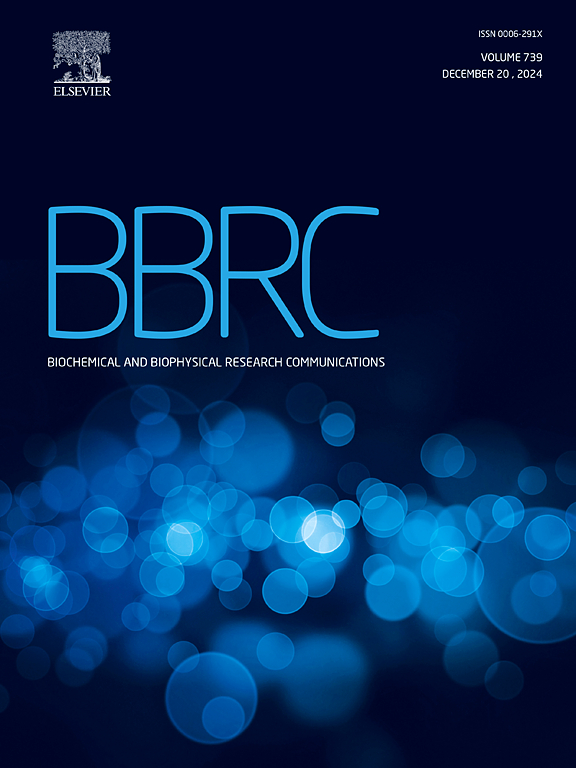低密度脂蛋白受体是黄病毒进入和复制神经元的重要宿主因子。
IF 2.2
3区 生物学
Q3 BIOCHEMISTRY & MOLECULAR BIOLOGY
Biochemical and biophysical research communications
Pub Date : 2025-01-01
DOI:10.1016/j.bbrc.2024.151160
引用次数: 0
摘要
黄病毒由蚊子传播,是节肢动物传播的传染病,对人类和动物都具有致病性,对全球公共卫生构成重大威胁。到目前为止,已经报道了黄病毒进入的多种内吞途径;然而,细胞因子在病毒复制和进入中的作用仍然不确定。在本研究中,我们确定了低密度脂蛋白受体的作用,低密度脂蛋白受体长期以来一直被确定为神经元的胆固醇载体,但作为乙脑病毒/西尼罗河病毒复制的必要宿主因子尚未被探索。为了探讨这一点,我们以10日龄BALB/c幼崽和两种不同来源的神经细胞系NSC34和HT22作为实验模型。利用sirna介导的基因沉默在体外短暂敲除LDLR基因,可显著降低病毒孵育时的病毒特异性转录物和蛋白质。此外,与非特异性egfp转染的细胞相比,转染ldlr的细胞感染后黄病毒的结合和内化明显受损。利用LDLR特异性多克隆抗体进行抗体中和实验,在体外显著降低病毒进入,提示LDLR是乙脑病毒和西尼罗病毒摄取的重要细胞附着因子。此外,通过质粒转染异位表达LDLR导致病毒在细胞中的复制显著增加,这表明LDLR除了作为乙脑病毒和西尼罗河病毒的活性附着因子外,还在黄病毒复制中发挥重要作用。总之,我们的研究结果表明,LDLR作为一种新的宿主因子参与了黄病毒的进入和复制,因此可以作为抗病毒研究的合适候选者。本文章由计算机程序翻译,如有差异,请以英文原文为准。

Low-density Lipoprotein Receptor is an important host factor in flaviviral entry and replication in neurons
Flaviviruses, which are transmitted by mosquitoes, are arthropod-borne infections that are pathogenic to both humans and animals, posing a significant global threat to public health. So far, various endocytic pathways have been reported for flaviviral entry; however, the role of cellular factors in viral replication and entry remains uncertain. Here in this study, we identified the role of Low-density lipoprotein receptor, which has long been established as a cholesterol carrier for neurons but remained unexplored as an essential host factor for JEV/WNV replication. To explore this, we utilized 10-day old BALB/c pups and two neuronal cell lines, NSC34 and HT22, both of different origin, as experimental models. Transient knockdown of LDLR gene in vitro using siRNA-mediated gene silencing drastically reduced viral specific transcripts and proteins upon viral incubation. Moreover, flaviviral binding and internalization were significantly compromised upon infection in LDLR-transfected cells when compared with non-specific eGFP-transfected cells. Antibody neutralization experiments using LDLR-specific polyclonal antibody significantly reduced viral entry in vitro, suggesting the role of LDLR as an important cell attachment factor for JEV and WNV uptake. Furthermore, ectopic expression of LDLR via plasmid transfection led to significant increase in virus replication in cells, indicating significant role of LDLR in flavivirus replication beside acting as an active attachment factor for JEV and WNV. Overall, our results indicate that LDLR act as novel host factor involved in both flaviviral entry and replication, thus serving as a suitable candidate for antiviral research.
求助全文
通过发布文献求助,成功后即可免费获取论文全文。
去求助
来源期刊
CiteScore
6.10
自引率
0.00%
发文量
1400
审稿时长
14 days
期刊介绍:
Biochemical and Biophysical Research Communications is the premier international journal devoted to the very rapid dissemination of timely and significant experimental results in diverse fields of biological research. The development of the "Breakthroughs and Views" section brings the minireview format to the journal, and issues often contain collections of special interest manuscripts. BBRC is published weekly (52 issues/year).Research Areas now include: Biochemistry; biophysics; cell biology; developmental biology; immunology
; molecular biology; neurobiology; plant biology and proteomics

 求助内容:
求助内容: 应助结果提醒方式:
应助结果提醒方式:


